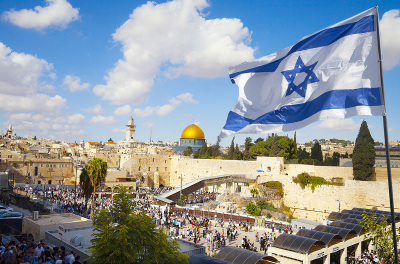God's heart for Israel is not a two-state solution

As a former Muslim, the love for Israel and its people is an entirely new experience for me but I am grateful the Lord has opened my heart to this understanding.
Recently in one Arab paper with millions of online viewers, the headline read: "Biden and Lapid: We support the two-state solution and peace in the region." It was their takeaway from Biden's recent visit, and it was an intelligent observation.
Biden boldly reinvigorated the policy of dividing up the land of Israel, ignoring the biblical warnings against it.
"The Palestinian people deserve a state of their own – sovereign, vibrant, and contiguous," Biden said. He made a point of re-establishing U.S. relations with the Palestinian Authority and demonstrated that commitment with $201 million in aid previously stalled by Trump.
A member of Biden's team said he wants to "rekindle a new political horizon" for the Israelis and the Palestinians, and a two-state outcome to the Israeli-Palestinian conflict is a foreign policy priority.
The Jerusalem U.S.-Israel Strategic Partnership Joint Declaration signed by both leaders restates President Biden's "longstanding and consistent support of a two-state solution and for advancing toward a reality in which Israelis and Palestinians alike can enjoy equal measures of security, freedom, and prosperity." Though the Declaration acknowledged the historic Abraham Accords, which established economic and technological cooperation between the Arab leaders and Israel, many commentators believe the visit reverses the recent progress toward Middle East peace by reviving the tired notion that Middle East peace is not possible without a two-state solution.
The focus of the Abraham Accords was normalizing Israeli relations with its Arab neighbors. A key draw for these countries was creating a robust U.S.-backed partnership against the threat of Iran's nuclearization and its continued support of terrorism worldwide.
Though many other benefits developed from the treaty, standing firm against Tehran was one of the primary motivations. The diplomatic ties and strategic partnerships that ensued finally exposed as a lie the longstanding premise that no peace could be possible in the Middle East without resolving the Israeli-Palestinian conflict.
Despite the stability and economic prosperity that flowed for Israel and its neighbors simply by "tabling" the conflict, the Negev summit with Secretary Antony Blinken in March signaled to the Arab world that change was coming. It was there that Secretary Blinken announced that the "regional peace agreements are not a substitute for peace with the Palestinians." Though U.S. officials made it clear they would not allow Iran to acquire nuclear weapons, they refused to give up on resuscitating those negotiations.
Therefore, it is no surprise that Arab leaders are nervous about putting their faith in a U.S.-led, anti-Iran coalition with Israel at the forefront. As a result, UAE officials are scrambling to mend fences with Iran, and Saudis are back to claiming that the "requirements for peace" are a two-state settlement with a Palestinian state in the occupied territories and East Jerusalem as its capital.
From the religious perspective, 400 rabbis signed a public statement discouraging the return to a two-state solution and pointing out how every time Israel relinquished land for peace, it led to increased terrorism and the killing of innocent civilians. The letter refers to the Jewish law that warns of the dangers of territorial concessions of the Land of Israel. It is further evidence that this course of action is not the road to peace.
For Americans, the conflict in the Middle East may seem like an endless quagmire of competing interests that we are rarely in a position to change. However, Christians must understand God's heart for Israel and its people.
From the beginning, God's promises to Abraham in Genesis 12: 2-3, He declares: "I will make you into a great nation and I will bless you; I will make your name great, and you will be a blessing. I will bless those who bless you, and whoever curses you I will curse, and all peoples on Earth will be blessed through you." This is a promise for all believers that blessings come to those who bless Israel.
We are also told that it is God Himself that established its boundaries. Before Joshua enters the promised land, God decrees:"Every place on which the sole of your foot treads, I have given it to you, just as I spoke to Moses. From the wilderness and this Lebanon, even as far as the great river, the river Euphrates, all the land of the Hittites, and as far as the Great Sea toward the setting of the sun will be your territory" – Joshua 1: 3-4.
Though the Israelites repeatedly disobeyed God's commandments and were often punished for their transgressions, His commitment to them never changed because the character and nature of God are immutable. Throughout the Bible, culminating in the final restoration of the nation of Israel in the Book of Revelation, God decries the destruction and divisions of its territory while repeatedly swearing an oath to avenge its people.
In those days and at that time, when I restore the fortunes of Judah and Jerusalem, I will gather all nations and bring them down to the Valley of Jehoshaphat. There I will put them on trial for what they did to my inheritance, my people Israel, because they scattered my people among the nations and divided up my land…The Lord will roar from Zion and thunder from Jerusalem; the Earth and the heavens will tremble. But the Lord will be a refuge for his people, a stronghold for the people of Israel. – Joel 3
So despite what governments will do in response to a political or social crisis, as believers, we must acknowledge that God's heart for Israel is not to divide its land or oppress its people. It is clear that any nation or people that defy these principles makes itself liable to the judgment of God for its actions in contradiction to His will.
Though we know, according to Biblical prophecy, the division of Israel is inevitable, the Lord is faithful to His promises and ultimately will restore Israel to its rightful place on Earth. Our duty as believers is simply to honor God's vision for the future.
Hedieh Mirahmadi was a devout Muslim for two decades working in the field of national security before she experienced the redemptive power of Jesus Christ and has a new passion for sharing the Gospel. She dedicates herself full-time to Resurrect Ministry, an online resource that harnesses the power of the Internet to make salvation through Christ available to people of all nations, and her daily podcast LivingFearlessDevotional.com.





















